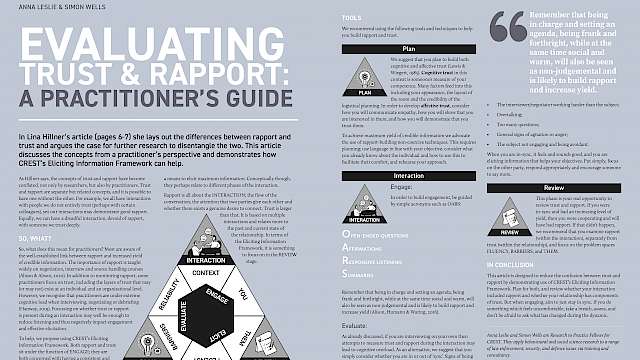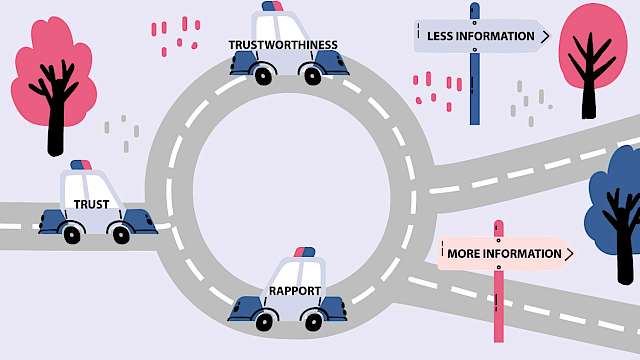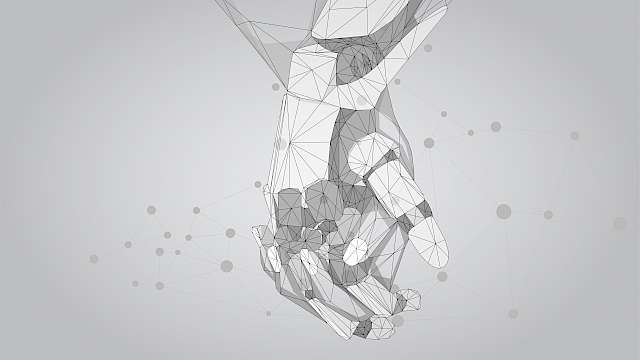Why is rapport important?
Researchers and practitioners agree about the importance of rapport for effective information gathering in investigative and intelligence contexts. Rapport concerns the quality of the interviewer-interviewee interaction, which can be characterised in terms of mutual attention, positivity, and connected flow between parties. Rapport-building lies at the heart of non-coercive interviewing approaches and is associated with greater satisfaction with the interview procedure and the interviewer’s behaviour, increased information disclosure, and more accurate memory retrieval. The benefits of building rapport have been replicated in laboratory and field research with a range of interviewees, including child and adult witnesses, suspects, cooperative sources, and convicted terrorists. As such, evidence-based interview models recommend rapport-building at the early stages of an interview and highlight the importance of maintaining rapport throughout the interview. Importantly, rapport-building should be viewed as a genuine attempt to connect with the interviewee rather than a transactional interviewing strategy. Insincere attempts to build rapport might backfire and render the interviewee less engaged and less cooperative.
What about trust?
Research on information gathering has given little consideration to the role of trust. Trust is the intention to assume vulnerability based upon the expectation of a positive outcome, and has been shown to reduce conflict and increase cooperation in domains such as teams and negotiations. Establishing trust in the interview room might well yield similar benefits.
The apparent neglect of trust in the information gathering literature might partly be due to the conflation of the concepts of rapport and trust. Scholars and practitioners often use these terms interchangeably, which seems reasonable considering that the few studies investigating the role of trust in an interviewing context yield similar results to those investigating rapport. However, other work suggests that trust is qualitatively different from rapport. Indeed, research examining rapport in professional service contexts has failed to show a statistical relationship with trust. This lack of relationship suggests that rapport and trust may be distinct constructs. Clearly, it is important to start disentangling the individual and conjoint effects of trust and rapport on elicitation outcomes.
Rapport and Trust: Related but distinct concepts
At a theoretical level, both concepts reflect qualities that demonstrate their distinctiveness. Rapport is related to the atmosphere and dynamics of an ongoing interactive event; it characterises the degree to which parties pay attention to one another and the natural flow from one topic to another during their conversation. In contrast, trust reduces the perceived risk associated with the outcome of an interaction. It decreases uncertainty about the other parties’ behaviour and is thus concerned with the aftermath of an interaction. Therefore, rapport and trust are related but independent concepts. Their relative importance in security contexts most likely varies from context to context and depends on the nature and length of a relationship. Rapport might be particularly important at the early stages of a relationship when little other information is available. Trust, given its dependency on repeated positive exchanges to develop, might play a stronger role over the longer term.
The conflation of rapport and trust is an oversimplification that will not prove useful in the long run.
To illustrate the relative importance of trust and rapport, imagine the following scenario: The intelligence services have approached you (i.e., the source) because you have information that is of interest to them, and you are about to have your first conversation with your contact person (i.e., source handler). You are free to give away or withhold information. The decision to do either will most likely depend upon the quality of the interaction. In the absence of previous experience and trust, rapport might be the determinant factor in whether you choose to provide information or not. If you fast forward two years, the relative importance of rapport versus trust might shift. By then, you will have had numerous conversations with your source handler and have grown to trust them. Given the stage of your relationship, a short and awkward conversation might not stand in the way of you providing information. Put differently, the fact that you trust your source handler might compensate for the fact that they are having an ‘off’ day.
This example raises multiple questions that should be addressed by future research:
- How does the relative importance of rapport and trust develop over the course of a source-source handler relationship?
- Does the presence of trust in the approaching institution (i.e., law enforcement or security agency) render rapport superfluous in the early stages of a source-source handler relationship?
- If trust in the source handler has been violated, will rapport-building attempts still be effective?
A way forward
It is increasingly clear that the conflation of rapport and trust in investigative contexts is an oversimplification. Although seemingly useful, this conflation may cause more harm than good as the beneficial effects of rapport might be overestimated while the benefits of trust might never be appreciated. At a minimum, researchers who investigate rapport should consider including measures of trust in their studies and vice versa. This will enable us to examine their relative effects. We also need to test rapport-building and trust-building under different circumstances and at different stages of relationship-building to enable new insights into effective context-specific elicitation tactics. A clear picture of the individual and conjoint effects of rapport and trust on information elicitation can unlock multiple new layers of influence, and result in well-informed advice for practitioners.
Lina Hillner is a PhD student at the University of Portsmouth. Her CREST-funded PhD project focuses on the role of rapport and trust in eliciting information in online contexts.
Read more
- Gabbert, F., Hope, L., Luther, K., Wright, G., Ng, M., & Oxburgh, G. (2020). Exploring the use of rapport in professional information gathering contexts by systematically mapping the evidence base. Applied Cognitive Psychology, 35(2), 329-341. https://doi.org/10.1002/acp.3762
- Macintosh, G. (2009). The role of rapport in professional services: antecedents and outcomes. Journal of Services Marketing, 23(2), 70-78. https://bit.ly/3Ig1xge
- Neequaye, D. A., & Mac Giolla, E. (2021). The Use of the Term Rapport in the Investigative Interviewing Literature: A Critical Examination of Definitions. PsyArXiV. https://doi.org/10.31234/osf.io/fmp8h
- Oleszkiewicz, J. S., & Granhag, P. A. (2019). Semi-cooperative sources’ affective resistance and cognitive strategies. In R. Bull, & I. Blandón-Gitlin (Eds.), The Routledge International Handbook of Legal and Investigative Psychology (pp. 255-267). Routledge.
- Rousseau, D. M., Sitkin, S. B., Burt, R. S., & Camerer, C. (1998). Not So Different After All: A Cross-Discipline View Of Trust. Academy of Management Review, 23(3), 393-404. https://bit.ly/3PaE5mW
- Tickle-Degnen, L., & Rosenthal, R. (1990). The Nature of Rapport and Its Nonverbal Correlates. Psychological Inquiry, 1(4), 285-293. https://bit.ly/3acsR2s
Copyright Information
Image credit: Andrey Popov | stock.adobe.com





